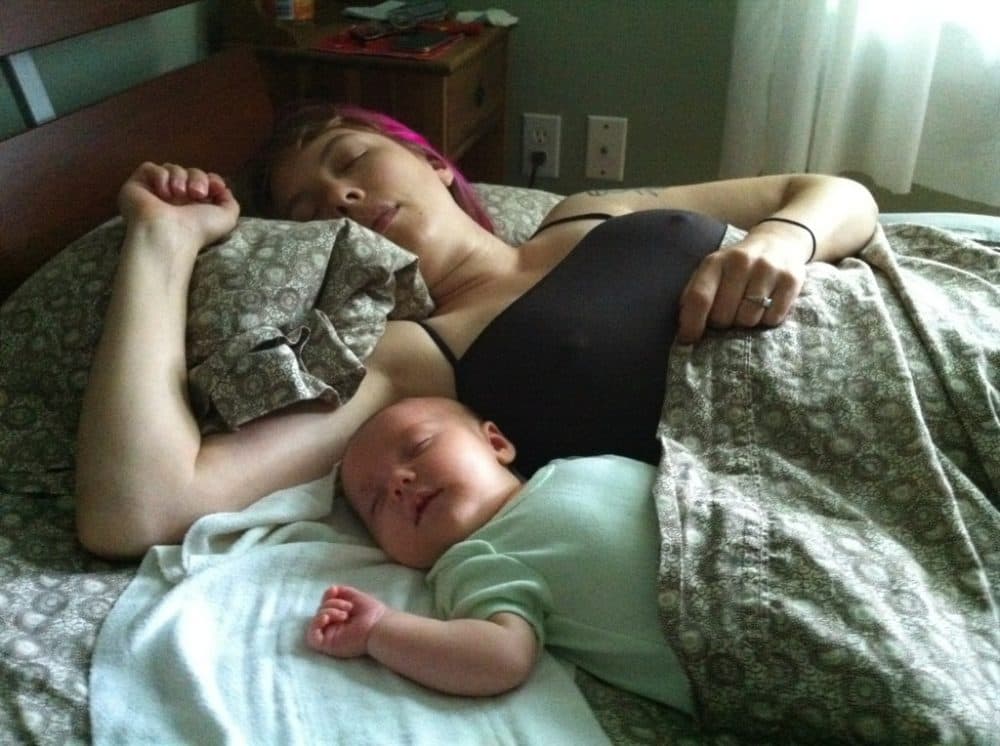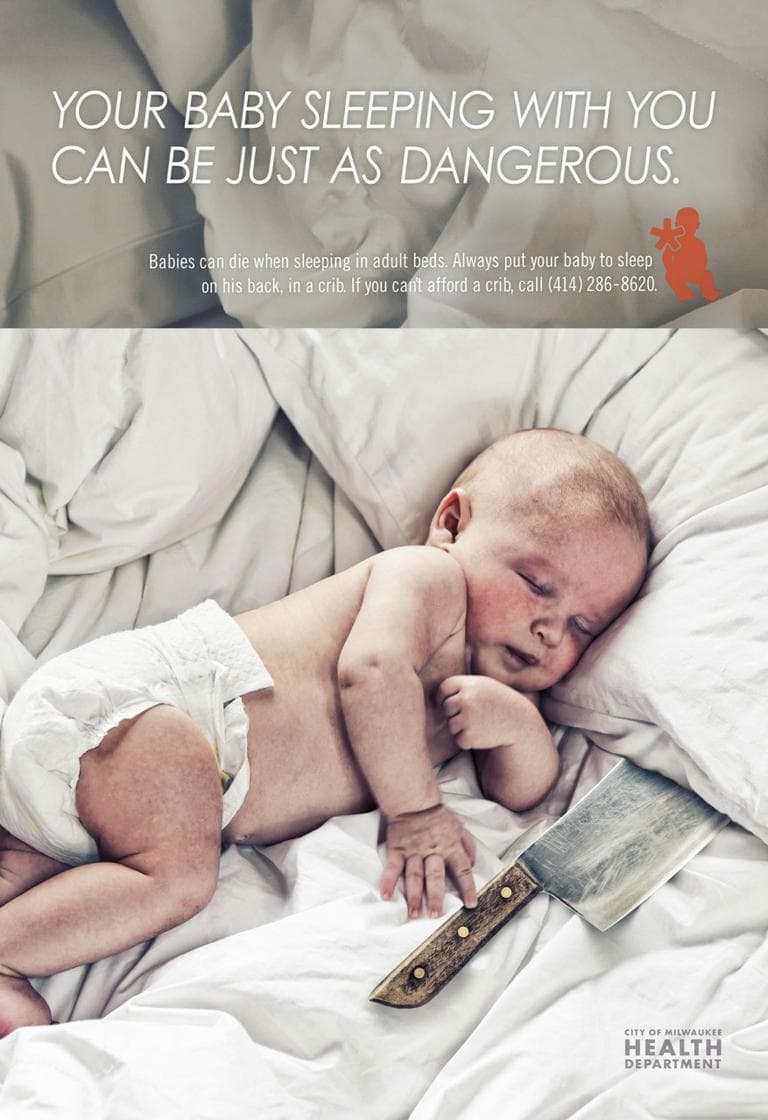Advertisement
Is It Time To Rethink Co-Sleeping?

By Sarah Kerrigan
Guest Contributor
Pediatricians and public health officials have long warned that “co-sleeping,” or sharing a bed with an infant, is unsafe.
But let's face it: almost everybody does it. So perhaps the time has come for the public health message to focus less on advising against it and more on advising how to do it more safely.
Because despite all the finger-waggling, co-sleeping is, and will continue to be, extremely common.
For instance, a recent survey, “Listening to Mothers III,” found that about 41 percent of new mothers report that they always or often share a bed with their babies in order to be closer. A 2007 study in Los Angeles County found bed-sharing rates in the range of 70-80 percent across races. And it's likely that bed-sharing rates are grossly underestimated.
In so many ways, sharing a bed with your infant makes sense. "There is no way I would have had the energy to get out of bed 3-5 times per night to go feed [my baby] in another room," says Lee, a Boston mother who asked that her last name not be used due to what she says is bias against bed-sharers.
There's no denying that there can be risks involved in sleeping in the same bed as your infant.
In the United States in 2010, 15 percent of all infant deaths were designated as Sudden Unexplained Infant Death, which includes SIDS, and some of these babies were likely in unsafe bed-sharing situations. “We feel a certain responsibility to work to prevent these deaths,” said Carlene Pavlos of the Massachusetts Department of Public Health.
But just as using a message of abstinence in place of sex education has been shown to be ineffective, so too might a one-sided message that only tells parents, "Don't share a bed with your baby.” Without offering a positive message of how to make bed-sharing safer, and even its potential benefits, public health organizations may be neglecting a key element to saving babies’ lives. Another Boston-area co-sleeping mother, Lindsey, said: “The fear around (co-sleeping) prevents people from talking about it. I know in my case, I was doing it in an unsafe way for a while because I was afraid to ask for advice.”
In my work as a pediatric sleep consultant, I often heard similar messages from families. There's often a sense of trepidation, fear or shame around bed-sharing, due in large part to messages from public health organizations that suggest bed-sharing is an ignorant choice tantamount to child abuse.
In 2009, a “Safe Sleep” campaign by the city of Milwaukee health department focused on a frightening anti-bed-sharing image depicting a tombstone at the head of an adult bed: “For too many babies last year, this was their final resting place.”

Another disturbing anti-bed-sharing poster equated a mother’s presence in bed to that of a dangerous weapon: it showed a baby sleeping next to a large metal cleaver with the words, “Your baby sleeping with you can be just as dangerous.” Really?
The risk factors that can make co-sleeping unsafe are very clear. They include: smoking, not breastfeeding, the use of prescription medications, illegal drugs or alcohol, obesity, sleeping on soft surfaces like couches, and using loose bedding and pillows.
But according to a bed-sharing expert, Dr. James McKenna of the University of Notre Dame, there is evidence that by removing these risk factors, bed-sharing in and of itself is not dangerous.
At a recent conference in Boston, McKenna explained that shared sleep between a mother and her nursing infant has many protective factors against unexplained infant death. Close proximity during sleep between a mother and her nursing infant helps regulate the infant’s body temperature and breathing patterns, and creates a healthy synchronicity between the mother’s and infant’s arousals at night, he said. This is because human infants have evolved to be perfectly adapted to their mothers’ bodies. Bed-sharing has also been shown to promote successful breastfeeding, which significantly reduces the risk of SIDS. Out of the millions of years of human history, the short time in which our modern culture has separated infants and mothers in various ways does not change the truth of our biology.
Liz Gomez explained how she initially decided to co-sleep with the first of her three children: “My son was six months old and I had been back to work for a month. I was so exhausted from getting up to go to the crib that I nearly drove into a tree on my way to work. I was so sleep-deprived that it was dangerous for me to operate a motor vehicle. Once we started co-sleeping, we all slept better.”
At the Boston conference, McKenna spoke in-depth about his decades of research on mother-infant sleep, SIDS and breasfeeding. As the leading researcher on these topics in the U.S., he has developed a list of “Safe Cosleeping Guidelines.”
Though McKenna was invited to be an ad hoc expert for the American Academy of Pediatrics SIDS Prevention Recommendations in 2005, the focus remained on “the hazards of adults sleeping with an infant in the same bed.” The AAP, the nation's most influential group of pediatricians, still comes down hard against bed-sharing. In 2011, though, the AAP did expand its SIDS policy recommendations to encourage room sharing for the entire first year of life. (Room sharing is when a baby sleeps in the same room as her parents, but on a separate sleep surface, like a crib or bassinet.)
McKenna asserts that families have the right to be informed about the benefits of co-sleeping, and that a one-sided directive against it is disrespectful and even dangerous. He says his research shows that family sleep environments are fluid, and that most babies sleep in multiple locations, including the parents’ bed.
A public policy statement on safe infant sleep that acknowledges the realities of family life, and offers a positive message on increasing bed-sharing safety, and perhaps even its benefits, might be more effective at saving lives than a strict anti-bed-sharing message. As Boston Association for Childbirth Education Executive Director Lorenza Holt said at the conference, “It’s about giving women information and honoring their right to make a decision.”
Sarah Kerrigan, M.A. is a Child Development Specialist, trained pediatric sleep consultant, and the mother of two young children.
This program aired on November 8, 2013. The audio for this program is not available.